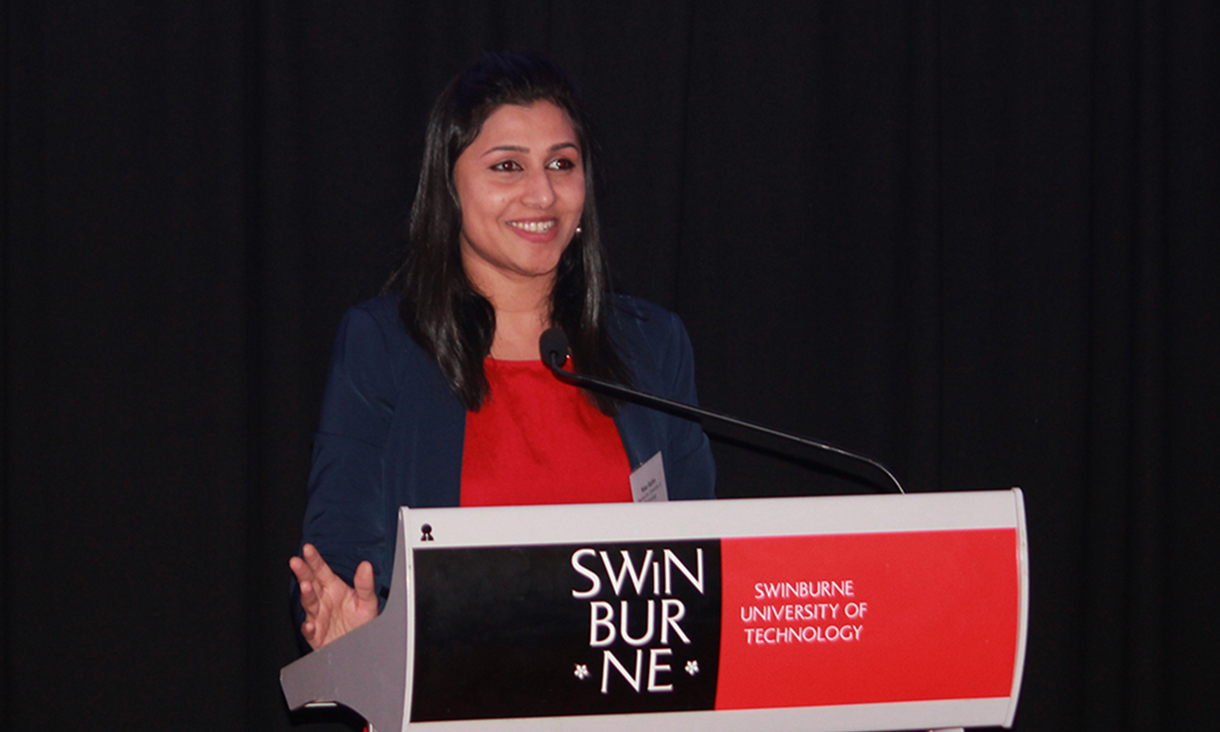Dr Nisa Salim recognised for high-quality approach to science

Dr Nisa Salim’s work is driven by the need to develop greener, safer and more sustainable transport systems.
In summary
- Swinburne Vice-Chancellor’s Initiative Research Fellow Dr Nisa Salim has been awarded the 2020 Phillip Law Postdoctoral Award for the Physical Sciences by the Royal Society of Victori
- She develops multifunctional materials with nature-inspired designs to solve challenging problems
Swinburne University of Technology’s Dr Nisa Salim, has been awarded the 2020 Phillip Law Postdoctoral Award for the Physical Sciences by the Royal Society of Victoria.
The award is for excellence in scientific research by an early career researcher in the physical sciences within seven years of completing a PhD from a Victorian research institution.
Dr Salim received her PhD in materials engineering from Deakin University and is currently a Vice-Chancellor’s Initiative Research Fellow at Swinburne.
She develops multifunctional materials with nature-inspired designs to solve challenging problems.
“The potential to use nature as a template for developing new technologies is exciting,” Dr Salim says.
Using a novel molecular self-assembly approach Dr Salim develops materials in various length scales and dimensions, creating working prototypes or devices from these materials.
Recent examples of her research include highly sensitive honeycomb-like porous foams for sensing applications, marine sponge-like fibres for energy storage and feather-like nanofibre networks for oil spill cleaning applications.
Carbon fibres are key to sustainable transport systems
“The porous carbon fibres are important materials that exhibit meso- micro- and macro- sized porous features and have high surface area, high oil adsorption and energy storage capabilities,” Dr Salim says.
Stronger than steel, lighter than aluminium and electrically conductive, these fibres are essential multifunctional materials for the future of sustainable and smart transport systems.
Dr Salim’s work is driven by the need to develop greener, safer and more sustainable transport systems.
“Greenhouse gas emissions from the transport sector are growing faster than emissions from any other sector in Australia,” Dr Salim says.
The porous carbon fibres can be used to create ‘structural supercapacitors and batteries’ that can store electrical energy in a structural component, such as a car, aircraft or drone body.
“With electric vehicles predicted to represent 90 per cent of all cars and light commercial vehicles on Australian roads by 2050, structural supercapacitors have the potential to revolutionise our transport by storing electrical energy in lightweight structural components of a vehicle’s body instead of in heavy, sole-purpose batteries,” Dr Salim says.
“Composite batteries are ideal materials to address the challenges of higher pay load and longer shelf life, and thus perform double duty both as body part as well the battery to power the vehicle.
“When this becomes a reality, we can deliver on-demand emergency medical and food supplies to those who are affected and isolated during flood, bushfire, or even during pandemics.”
Dr Salim and her research team are working with Australian small to medium enterprises (SMEs) to demonstrate the exciting potential of these new multifunctional materials. She is leveraging her collaborative relationships with a global academic and industrial network to take this cutting-edge research from the lab to the market place.
Dr Salim is a strong supporter of women in Science, Technology, Engineering, Mathematics and Medicine (STEMM).
“It is critical to get adequate support for early career researchers, especially women, to get encouragement and support to pursue their career,” she says. "Always look for how to harness the opportunities that keep you ambitious.”
Dr Salim recently presented a public lecture, hosted by the Royal Society of Victoria on her work, titled “Inspired by Nature: Engineering Multifunctional Materials,” where she was presented with the Phillip Law Postdoctoral Award and a prize of $3,000.
-
Media Enquiries
Related articles
-

- Technology
- Science
- Engineering
Victorian students drive green energy transition through international hydrogen competition
Swinburne’s KIOSC, in collaboration with Horizon Educational and Gippsland Tech School, co-hosted the Hydrogen Grand Prix in Melbourne.Friday 26 July 2024 -

- Technology
- Health
New MedTechVic prototypes to transform everyday lives of people with a disability
Swinburne’s MedTechVic has revealed three new prototypes designed through the joint Health-led Manufacturing Innovation Program, in partnership with the Australian Medtech Manufacturing Centre and Safer Care Victoria
Friday 19 July 2024 -

- Science
Skin, scales and fish tails: using collagen to turn fish guts into gold
New research from Swinburne could transform the sector by converting high value collagen proteins from seafood by-products into cosmetics, food, and pharmaceuticals.
Tuesday 02 July 2024 -

- Science
- Engineering
Submarines in the future could self-identify cracks and self-heal thanks to Swinburne researcher
Thanks to the work of Dr Nisa Salim from Swinburne University of Technology’s School of Engineering, future submarines could self-identify microcracks and self-heal using a new kind of carbon fibre reinforced polymer composites.
Monday 17 June 2024 -

- Business
- Technology
Swinburne’s Luminate Pitch Night 2024 advances innovative ideas for a better world
Swinburne’s 2024 Luminate Pitch Night showcased market-ready ideas from 10 founders
Wednesday 12 June 2024

